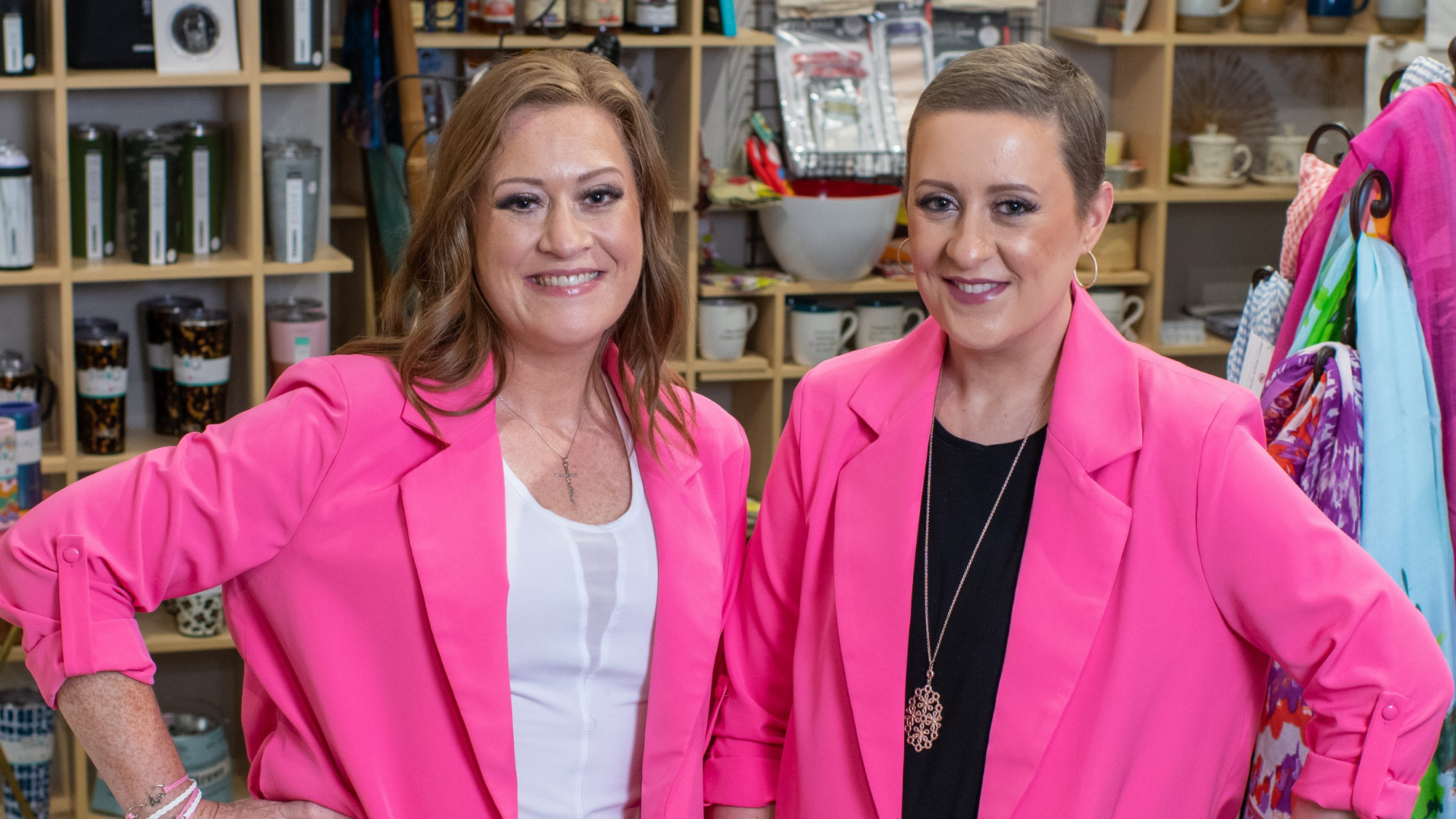View Larger Image

Sisters Amber Vanaman and April Biggs, diagnosed with breast cancer one year apart, have been fighting the disease together.
Image by Bryan Clifton
Two Sisters Battle Breast Cancer at UAMS
| Like many sisters, April Biggs and Amber Vanaman have shared a lot as siblings. Just one year apart, they shared a bedroom and clothes growing up in Paragould, Arkansas, and have some of same facial features — definitely the same smile.
But they never expected to share a life-threatening disease.
Biggs was diagnosed with Stage 4 metastatic breast cancer in October 2020 after a routine screening at her local hospital.
“I called my husband immediately and then my mother,” said Biggs. “She was in my office in 10 minutes holding me while I cried. My husband did the research immediately, and we knew UAMS would be the best place to go since it’s a research and teaching hospital.”
Treatment started immediately at the University of Arkansas for Medical Sciences (UAMS) Winthrop P. Rockefeller Cancer Institute.
“We knew going in that April had a tumor with significant involvement of the lymph nodes,” said Ronda Henry-Tillman, M.D., FACS, UAMS chief of Breast Surgical Oncology. In all, her treatment included 10 rounds of chemotherapy, removal of 26 lymph nodes and 28 rounds of radiation. Biggs is now taking a targeted immunotherapy drug that helps block the proliferation of her specific tumor.
“Not everyone understands exactly how to use the immunotherapy drugs that are available,” said Henry-Tillman. “In a case like this, it’s so important to see a doctor who understands the latest research and data to increase life expectancy. Women live with metastatic breast cancer.”
UAMS physicians recommended that Vanaman, who had never had a mammogram, be screened as soon as possible. She was 39 years old, just one year shy of the recommended age for most women to have their first baseline mammogram. The American Academy of Breast Surgeons recommends women with a family history of breast cancer have their first mammogram at age 35.
The siblings’ mother, Lea Ann, had a benign breast tumor removed five years prior to her daughters’ diagnoses and had several lumpectomies in her 20s. But after genetic testing, they were surprised to learn there was no genetic marker present for breast cancer.
Henry-Tillman said it’s not uncommon to find no genetic predisposition in siblings. “We’re still discovering all the mutations that cause breast cancer. That’s why research has to continue.”
“They saw a very small spot on my mammogram that they normally would have had me come back in six months to check again, but because of April’s diagnosis, they decided to do a biopsy on the spot. It showed I had the same breast cancer but at the earliest stage possible,” said Vanaman.
Vanaman leaned on her sister immediately for support and advice. They texted each other daily and saw each other almost every night after Vanaman’s mastectomy, also performed by Henry-Tillman. Keith Wolter, M.D., performed her reconstructive surgery.
The day Vanaman had her double mastectomy, Biggs had her final radiation treatment.
“We were both healing at the same time, but I would go over every night to help her with her drainage tubes,” said Biggs. “We have a very deep bond as sisters, and our shared experiences have brought us closer together. Over the last year, we have become the best of friends.”
Biggs is feeling better after a May PET scan showed the cancer was gone from her iliac bone. She is grateful to her UAMS doctors for the extra time she’s been given. As for Vanaman, because her cancer was caught early, she has less than a 2% chance of it returning.
“I know that I made the right choice by going to UAMS,” said Biggs. “Every medical professional and staff member that I have ever dealt with has been incredible and made me feel so comfortable every step of the way. I trust everyone I have met at UAMS. Being able to trust that you are receiving the right course of treatment for your condition is a great feeling and gives you a sense of relief.
“The medical professionals at UAMS were so thorough with each visit and scan,” she added. “They took the time to explain things to me so that I understood exactly what we were dealing with. On my first visit, I was able to meet with a social worker who was incredible. She was so caring and helpful to me.”
Tiffany Hadden, LMSW, recalls meeting with Biggs on her first day at the Cancer Institute.
“I told her about my role, primarily as an emotional support but also available to help with financial or community resources if needed. I shared some strategies for managing worry, since April is a planner, and so many patients feel a loss of control, especially at the beginning,” said Hadden.
Today, Biggs takes every opportunity to talk to women about early detection —especially to her other two sisters, Autumn and Allison, third and fourth in the family lineup. They, too, are getting mammograms and MRIs every six months.
“If I had known five years ago what I know today, I would have made sure to get screenings before I turned 40, even though my mom tested negative for both BRCA genes,” said Biggs.
“There have been so many advancements in treatments that can help you live longer with a Stage 4 diagnosis,” she said. “My hope is that one day they can find a cure for Stage 4 breast cancer, and it would be incredible if the researchers at UAMS may be the ones who find that cure, possibly by using my case in their research.”